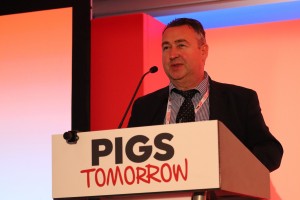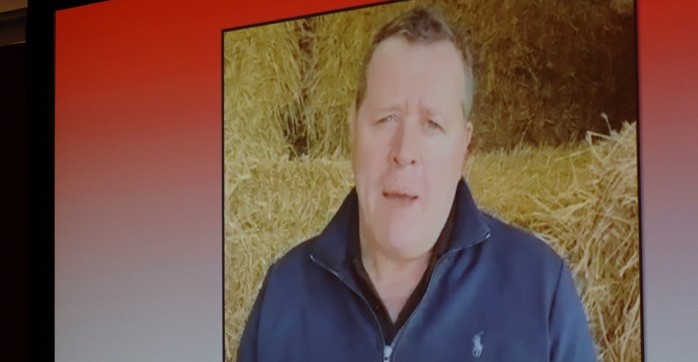New regulations governing pig contracts set to be introduced by Defra will help fix the broken pork supply chain, Farming Minister Mark Spencer told the recent Pigs Tomorrow conference.
The Minister said Defra’s consultation on contractual practice highlighted a clear need for action and promised that the Department would work with the entire supply chain to shape workable regulations that aim to deliver more fairness, certainty and transparency on all sides. But he warned that it will take time to put it all into practice.
Pigs Tomorrow, organised by Pig World and AHDB, brought people from across the industry together for two days in Leicestershire, covering a range of topics, including the international pork sector outlook, the UK supply chain, the sustainability agenda, the industry’s reputation and how to attract more young people into the sector.
Addressing the conference via video link, Mr Spencer thanked the industry for ‘engaging so proactively’ with the review, which attracted 370 responses last year.
“To inform decisions, it was important to hear from as many of you as possible and we were really encouraged with the number of people who took the time to respond,” he said.
“And there was a clear message that the system is broken and it needs to be fixed. So, we committed to developing a regulatory code of conduct to govern selling arrangements between pig farmers and their customers.
“The regulations will ensure that written contracts are in place, which will provide clarity for both parties about what is expected.”
He said the issues surrounding the pig backlog were exaggerated by uncertainty over how many pigs were due to be collected.
“Such unpredictability does not provide a foundation on which an industry can thrive,” he said. “However, certainty can only be provided if contracts are genuinely adhered to and consultation responses were very clear that short notice changes to terms and conditions undermine the position of farmers. “One of the aims of the actions that were we are taking is that, once contracts are signed, they are adhered to.”
He said the regulations would seek to ‘outlaw any activities that are manifestly unfair’, highlighting the ‘shocking’ example of producers having to pay processors to take pigs during the backlog, only for these pigs to go into the supply chain. “That cannot be allowed to continue,” he said.
Another key message from the review was the ‘inadequate’ nature of data available across the supply chain. “We have also committed to using the powers we have at our disposal to improve transparency. We aim to strengthen market reporting and build a more sophisticated picture of overall pig numbers so all the actions in the chain are better able to be predicted,” Mr Spencer added.
“We know these regulations need to be carefully considered and we want to work very closely with all parts of the supply chain as we develop the detail. I’d like to stress that this is a long term solution, not a quick fix.
“These regulations are intended to play their part in ensuring a sustainable and profitable future for the UK pig sector for generations to come. We have already begun this work and we will need to balance the need for action with the necessity of taking the time to get it right.”
Next steps

The head of Defra’s Agriculture Sectors Team, John Powell, who has regularly engaged with the industry on the review, then set out the findings from the consultation and Defra’s next steps in more detail. In summary, it will:
- Share findings with the Competition and Markets Authority (CMA).
- Commence work developing regulations for pig contracts. These will ensure written agreements are used between all producers and their buyers.
- Work closely with industry to explore what other provisions, if any, should be mandated as part of these agreements.
- Continue to engage with stakeholders to ensure that legislation works for all parts of the UK and incorporate special provision for differing circumstances, if necessary.
- Develop regulations to collect and disseminate more supply chain data, particularly in relation to wholesale price transparency and national slaughter numbers.
Asked about the timescales involved for the new legislation to be in place, Mr Powell said: “We haven’t put a deadline in place and there is no reference to timetables. We are at the start of the process and will be engaging with different parts of the sector.
“It would be useful if the industry could start the discussion. What are some of the mandatory things we should be looking at? What are the challenges that would be best addressed through formal contracts?
“We also don’t want to restrict the opportunity for producers to be more flexible and to take advantage when there are opportunities.
“It’s going to be a complicated process. We will work as quickly as we can, and we will work with everyone in the sector for as long as it takes to make sure we get a long-term solution.”
Also at the conference

Over the two days, some common themes emerged about sustainability and industry reputation, both at a UK and global level.
Rupert Claxton, from industry analysts, Gira, set out the vast range of challenges facing producers across the world, including increasing pressures to adapt to consumer and supply chain demands around climate change, animal welfare and more.
Christian Fink Hanson, director Danish Agriculture & Food Council Pig Research Centre, explained the reasons behind the significant decline in the Danish pig herd, while also setting out the measures put in place for Danish farmers to deliver on the sustainability agenda, including a target of a 50% reduction of CO2 emissions in primary pig production by 2030 (from a 2005 base) and moves away from farrowing crates, as part of wider animal welfare changes.
Sustainability was also a theme of PIC’s Isaac Huerta’s presentation on the Spanish pig industry, which has generally bucked the EU trend in terms of herd growth, despite a step back last year.
On Day Two, the focus was very much on the supply chain, engagement with the public and proactive messaging to maintain and improve the industry’s reputation, including via social media, and addressing labour shortages and encouraging future talent in the pig sector, a huge challenge for the industry. This included a ‘Young Guns’ session, allowing the pig farmers of the future to set out their priorities.
- You will be able read full reports on every session in a special supplement in June’s Pig World.




